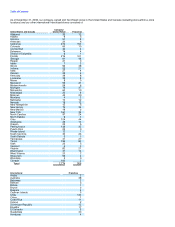GNC 2009 Annual Report Download - page 25
Download and view the complete annual report
Please find page 25 of the 2009 GNC annual report below. You can navigate through the pages in the report by either clicking on the pages listed below, or by using the keyword search tool below to find specific information within the annual report.
Table of Contents
We depend on the services of key executives and changes in our management team could affect our business strategy and adversely
impact our performance and results of operations.
Some of our senior executives are important to our success because they have been instrumental in setting our strategic direction, operating
our business, identifying, recruiting and training key personnel, identifying opportunities and arranging necessary financing. Losing the services
of any of these individuals could adversely affect our business until a suitable replacement could be found. We believe that they could not
quickly be replaced with executives of equal experience and capabilities. Many of our executives are not bound by employment agreements
with us, nor do we maintain key person life insurance policies on any of our executives.
In the last two years, we have experienced significant management changes. Our Executive Chairman of the Board, Robert J. DiNicola
resigned immediately prior to the closing of the Merger. In addition, Susan Trimbo resigned effective March 31, 2007 as our Senior Vice
President of Scientific Affairs, Mark Weintrub resigned effective September 30, 2007 as our Senior Vice President and Chief Legal Officer and
Curt Larrimer resigned effective December 31, 2007 as our Executive Vice President and Chief Financial Officer. Effective September 30, 2008,
Michael M. Nuzzo was appointed as our Executive Vice President and Chief Financial Officer. Effective as of January 13, 2009, Joseph J.
Weiss, Senior Vice President of Merchandising, was no longer employed by us. We will continue to enhance our management team as
necessary to strengthen our business for future growth. Although we do not anticipate additional significant management changes, these and
other changes in management could result in changes to, or impact the execution of, our business strategy. Any such changes could be
significant and could have a negative impact on our performance and results of operations. In addition, if we are unable to successfully
transition members of management into their new positions, management resources could be constrained.
Compliance with new and existing governmental regulations could increase our costs significantly and adversely affect our results of
operations.
The processing, formulation, manufacturing, packaging, labeling, advertising, and distribution of our products are subject to federal laws and
regulation by one or more federal agencies, including the FDA, the FTC, the Consumer Product Safety Commission, the United States
Department of Agriculture, and the Environmental Protection Agency. These activities are also regulated by various state, local, and
international laws and agencies of the states and localities in which our products are sold. Government regulations may prevent or delay the
introduction, or require the reformulation, of our products, which could result in lost revenues and increased costs to us. For instance, the FDA
regulates, among other things, the composition, safety, labeling, and marketing of dietary supplements (including vitamins, minerals, herbs, and
other dietary ingredients for human use). The FDA may not accept the evidence of safety for any new dietary ingredient that we may wish to
market, may determine that a particular dietary supplement or ingredient presents an unacceptable health risk, and may determine that a
particular claim or statement of nutritional value that we use to support the marketing of a dietary supplement is an impermissible drug claim, is
not substantiated, or is an unauthorized version of a "health claim." See Item 1, "Business—Government regulations—Product regulation." Any
of these actions could prevent us from marketing particular dietary supplement products or making certain claims or statements of nutritional
support for them. The FDA could also require us to remove a particular product from the market. For example, in April 2004, the FDA banned
the sale of products containing ephedra. Sale of products containing ephedra amounted to approximately $35.2 million, or 3.3%, of our retail
sales in 2003 and approximately $182.9 million, or 17.1%, of our retail sales in 2002. Any future recall or removal would result in additional
costs to us, including lost revenues from any additional products that we are required to remove from the market, any of which could be
material. Any product recalls or removals could also lead to liability, substantial costs, and reduced growth prospects.
Additional or more stringent regulations of dietary supplements and other products have been considered from time to time. These
developments could require reformulation of some products to meet new standards, recalls or discontinuance of some products not able to be
reformulated, additional record- 20
























